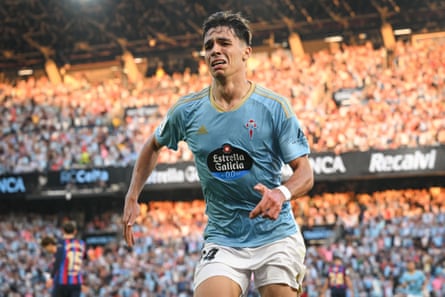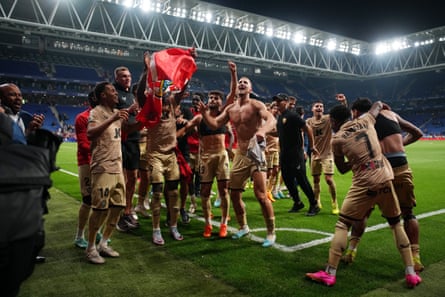“Life hits you hard sometimes; this is one of those times,” Papa Pezzolano said when at last it was over and it was confirmed that his team was the one heading to the second division, hope eventually extinguished in the 100th minute of the final day of the longest season. “The dressing room is destroyed,” the Real Valladolid coach admitted as his voice cracked and the tears came. Across the way, that could have been meant literally; in there, the beers were open and Getafe’s players, survival secured, were climbing on tables and leaping about, crashing into each other, throwing things about, soaking and serenading the coach who had come to rescue them. “Bordalas, I love you,” could be heard through the walls.
All over Spain similar scenes were repeated – in Valladolid and Vigo, Elche, Seville and Barcelona – and everywhere there were tears. “I’m close, yeah,” Cádiz manager Sergio admitted afterwards, speaking for everyone. “I’m absolutely exhausted; I’m dead,” said Valencia coach Rubén Baraja, doing much the same. “My heart’s still going at 130 bpm; there was so much tension,” added Almería manager Rubi. When it came to Gabri Veiga, he declared “This is everything to me. I love Celta”, but actions spoke even louder: the kid whose two goals saved them and were probably his last service for the club where he grew up, sat on the bench at Balaidos and broke down, sobbing.
It had been that kind of night. There may never have been a fight for survival like this. Six teams had gone into the final game within two points of each other and the last relegation place. Just after 11pm, five were finally liberated while Valladolid, unable to score the goal that would have saved them against Getafe, could only “go to hell” as the headline in one local paper had it. If that had always been likely – of the 243 permutations, 135 meant them going down – the way it happened wasn’t. Three teams had occupied that final relegation place on Sunday, however briefly, and with three minutes nine seconds left, Valladolid were safe; with three minutes eight seconds left, they weren’t, their fate ultimately decided not at their José Zorrilla home – although that too – but 672km away at Espanyol.
Cádiz (41 points), Getafe (41), Valencia (41), Almería (40), Celta (40) and Valladolid (39) came into the final game with fate in their own hands. Cádiz were at Elche, Valencia were at Betis, Almería were at Espanyol, who had been relegated in the 93rd minute last weekend, Celta played Barcelona and Valladolid and Getafe faced each other. Because La Liga uses head-to-head records when teams finish level, and mini-leagues in the event of multiple-ties, all knew that if they won they would stay up.
Only it doesn’t work like that, even if it should. “Every player will say ‘ah, we have to focus only on ourselves’, but that’s bullshit,” Celta midfielder Renato Tapia admitted afterwards as the tension finally slipped away to the sound of Jorge Celedón coming through the dressing room wall. “I’m sorry, you have to know what’s happening in the other games,” he insisted. And so, sitting alongside him on the bench, Iago Aspas had his phone out, watching what was going on elsewhere. At least until half-time, when he admitted he couldn’t take any more.
What was going on was this.
After 54 seconds, Ayoze Pérez put Betis 1-0 up against Valencia. And then in 52 seconds across three grounds, everything shifted. On 9m 16s, Gonzalo Escalante scored the opening goal for Cádiz and on 9m 54s El Bilal Touré put Almería 1-0 up, those two seemingly safe against opponents that no one expected to really care. And on 10m 08s, Franck Kessié then gave Barcelona the lead, silence suddenly falling at Balaidos. Celta, who had not been in the relegation zone all season, but who had done everything they could to shoot themselves in the foot, winning just one of their previous 11, now slipped into the bottom three.
The good news was that it was brief – and never official. On the bench, staring at his phone, Aspas was practically shaking. But on 11m 23s, the goal was ruled out for the tightest of offsides. That spell in the drop-zone had lasted little over a minute, although it appeared liable to return any time. Celta were nervous, Barcelona dominant. Fifteen minutes later, Kessié missed a simple header at the far post.
Everyone was on edge. Down in Elche, where the home team were demonstrating a dignity that went beyond the call of duty, there was an equaliser – ruled out three long minutes later – and an astonishing miss. Over at Espanyol, where fans were focused on their protests, throwing beach balls on the pitch, there was an actual equaliser, scored by Javi Puado on 19 minutes. And then in the 42nd minute Celta scored, Veiga dashing through to slip calmly past Marc-André ter Stegen, running off arms wide, eyes streaming with tears, Balaidos going wild.
In Valladolid, meanwhile, nothing much was happening, which was just the way Getafe wanted it. Knowing a draw would keep them safe, they were going the full Bordalas: they had completed just 37 passes by half-time, less than a pass a minute – only they hadn’t played anything like 37 minutes.
Valladolid were the team going down still, but all they needed was a goal to change everything and they didn’t even need to get it themselves. On 48m 32s Ronaël Pierre-Gabriel, making only his second start of the season, put Espanyol ahead and Almería, unexpectedly, into the relegation zone. In Valladolid, where they were listening on radios and watching on phones – which probably beat watching what was happening on the pitch – there was a roar, celebrations at survival delivered from a distance. Which, with hindsight might not have been such a good thing – might they have played differently if they knew it really did depend on them? – and just under 10 minutes later Adri Embarba scored a belting equaliser to make it 2-2, pulling Almería back out of the bottom three and Valladolid back in again.
It still wasn’t over. Veiga got a second a little after the hour, Celta close now. Valencia got an equaliser against Betis on 70. The very next minute, Elche got the equaliser against Cádiz they had been denied earlier. Everyone was a goal away from everything changing, still staring into the abyss. The big moment came in Barcelona on 72m 44s when Luca Koleosho, a Canadian with a youth-team contract and just 44 first-team minutes, bent in a brilliant goal to give Espanyol the lead and send Almería back into the relegation zone, celebrations starting again in Valladolid. Somehow, they were going to survive. With 10 minutes to go, Ansu Fati pulled one back for Barcelona, fear taking Celta once more. All six teams still on edge.

Almería above all. “We knew that practically nothing was happening at Zorrilla, that Barcelona were losing and that we needed a goal,” coach Rubi said. On 82m 44s Largie Ramazani tumbled in the Espanyol area. Instead of giving a penalty the referee ran over and pulled out a yellow card for a dive, but he was called to the VAR, heading to the screen on 83m 55s, and heading away again to point to the spot on 84m 28s. The whole season hung on this, one shot for survival. Embarba had the ball in his hands, but Ramazani wanted it. There were discussions, words exchanged with opponents, a card taken out, time going by, tension rising. Embarba took a few steps back and waited, the world on his shoulders. One of Almería’s coaching staff couldn’t watch – they don’t have a good record from penalties – headed down the tunnel and hid. Eventually on 86m 52s, Embarba took a couple of steps to his left, started to run and scored.
In the crowd at Espanyol, the camera caught Lucia, the wife of Almería midfielder Gonzalo Melero, unable to take any more, tears coming. In the crowd at Valladolid, a man buried his head in his scarf, crying. They had been safe for 23 minutes; now they had less than half that to get there again. On 89m 27s Gonzalo Plata almost did, dashing inside and sending a wonderful shot bending just past the post. Centimetres more and they would have been safe. Six minutes were added; barely one was actually played. Jawad El Yamiq headed over Plata’s cross on 95m 38s. Goalkeeper Jordi Masip went up for a free-kick that was played short and wasted. A corner was won on 97m 12s, but they were not given the chance to take it, the whistle going.
Quick Guide
La Liga results
Show
Celta Vigo 2-1 Barcelona, Elche 1-1 Cádiz1, Espanyol 3-3 Almería, Real Betis 1-0 Valencia, Valladolid 0-0 Getafe, Mallorca 3-0 Rayo Vallecano, Osasuna 2-1 Girona, Real Madrid 1-1 Athletic Bilbao, Real Sociedad 2-1 Sevilla, Villarreal 2-2 Atlético.
It was over. Well, it was here. A goal in Barcelona, where Rubi was raising a finger, signalling a single minute left, would still rescue them, Espanyol their unexpected saviours. And so they waited, watching their destiny decided elsewhere, or hoping it would be, someone else doing for them what they could not do for themselves, until the clock at Espanyol read 99m 19s and it ended 3-3. Almería were safe. So were Getafe, Celta, Valencia and Cádiz. Valladolid were down again, a year after coming up. What was missing, Masip was asked. “A goal,” he said. Some 70% of possession had not brought a shot on target; 38 weeks had brought just 33 goals. A change of coach, Pacheta sacked for Pezzolano, had brought no change.

For everyone else, the final day had brought relief. Exhausted, empty now, desperate for it to end, they had needed it. “When I came on my guts were up here,” Celta’s Tapia said. He had been taken to hospital in the week, feeling dizzy and sick, blood pressure low. Now he just felt happy. “This is magical: when we scored some of the lads laughed, some cried too. It was a rollercoaster of emotions,” he said. “That ending was a heart attack,” said Getafe striker Jamie Mata, heading off to open a beer. In the other dressing room, there was just quiet. It was over. “There is no consolation,” Masip said.

